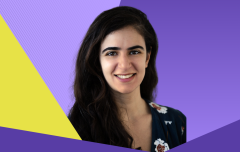Women's Month staff spotlight - Cristina Dominguez
I am Cristina Dominguez, originally from Guatemala, and I have over seven years of experience supporting countries with their planning of energy access and energy transition strategies, having designed, managed, and implemented different projects with a wide range of stakeholders in Africa, South Asia, and Latin America.
I hold a PhD in Sustainable Energy Access from ETH Zurich, for which I developed a geospatial data-driven model to estimate the energy demand of rural households in developing countries to improve rural electrification strategies. I worked as a Postdoctoral Researcher at the Swiss Federal Laboratories of Material Sciences and Technology, finding optimal strategies to minimize energy consumption and carbon emissions in the building sector. I also worked as a Research and Project Management Consultant for the UK’s Foreign, Commonwealth and Development Office (FCDO) funded programme Climate Compatible Growth, supporting the integration of energy planning efforts in East Africa.
Currently, I work as an Energy Planning Specialist at SEforALL, supporting countries in their development of Integrated Energy Access Plans. I am involved in different initiatives in which, together with partners, we generate knowledge products and data to guide efforts towards an efficient allocation of resources and work to build and enhance technical capacity needed within governments.
Reflecting on your involvement in various SEforALL projects & initiatives, could you highlight one that you found particularly impactful in advancing the inclusion and empowerment of women?
In 2023, under the scope of the Joint Summer School on Modelling Tools for Sustainable Development organized by the International Centre for Theoretical Physics and the Climate Compatible Growth Programme, we had the opportunity to work in collaboration with different partners in the energy sector to co-create and offer training tracks aimed at strengthening skills around the best practices for geospatial data management and the application of geospatial data for improving clean cooking access planning.
An important highlight of this initiative is that we supported the participation of nine women professionals, fostering their skills to undertake key leadership and technical roles within their government’s planning units and forming the leaders for the future. This year, we are also encouraging women to participate in and benefit from this exciting opportunity.
What do you perceive as one of the primary challenges in fostering women's increased participation in the sustainable energy sector?
The sustainable energy sector is facing a fast-paced digital transformation. From the planning perspective, new tools are becoming available, and new databases are being produced to support energy planners in optimizing their operations. However, planning units within ministries/utilities are not keeping up at the same pace and developing countries may be left behind. While women’s participation in these planning units is increasing, a noticeable opportunity gap still exists. To address these challenges and for scaling up clean energy solutions, there is a strong need to strengthen capacity in the sector’s value chain, specifically targeting women to increase their participation in leadership and technical roles.
What guidance or advice would you extend to women who aspire to establish careers in sustainable energy?
In my career, I have certainly witnessed that our participation in the energy sector and STEM careers in general is not as high as we might think, especially in developing countries. Through my research in different countries and contexts, I have found that empowering women is key to achieving energy access goals, especially as decision-makers when adopting cleaner technologies and unlocking local development opportunities [1,2,3].
Our countries need more motivated women assuming key leading roles, providing solutions to bridge the existing energy access gaps, and driving the sustainable energy transition. To help overcome this challenge, as part of my volunteering work in my current role as Secretary of the Executive Committee for the UNESCO Organization for Women in Science in the Developing World in Guatemala, my home country, we work for promoting women participation in science and to encourage girls to pursue STEM careers. I strongly believe that we have the power to empower, and by doing this, we can improve the quality of life of millions of people around the world.





